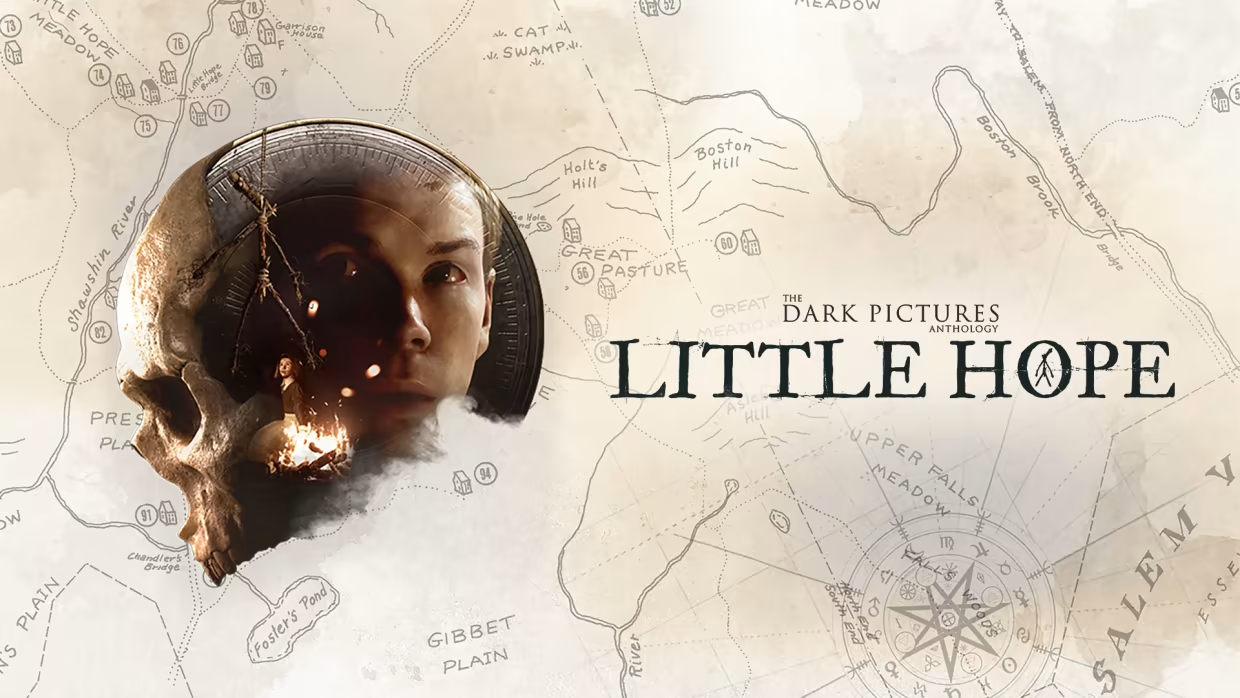Chorus
Chorus is a competent space combat shooter that offers fast-paced action and a fascinating if underdeveloped story. The lack of mission variety can hold the experience back, but the game’s space dogfights are usually exhilarating enough to make up for it.
The protagonist is Nara, a former ace pilot of the Circle, a religious group that is wreaking havoc in the galaxy, trying to make people submit to their doctrines by force and killing those who refuse. She is a deserter in hiding, working as a simple scavenger for a man named Sav in the reclusive settlement of the Enclave.
Nara chose a job that wouldn’t let her forget her past deeds: while scavenging, she often comes across ships destroyed by the Circle and has to explore their ruins in search of loot, recognizing her work in the wreckage. One day, however, when the Circle comes for the Enclave, Nara decides to join the Resistance and directly oppose her former friends.
Nara is a protagonist consumed by guilt and remorse, which she tries to conceal from others. Her outer self is a charismatic façade: when she speaks to Sav and the various people she meets, Nara is confident, willful, and even inspiring – she shows all the signs of a great leader. But there’s also another Nara in the form of a harsh, self-deprecating voice that often whispers fatalist words about current events. She’s marked by this duality: Nara encourages everyone around her to do their best, reassuring them that defeating the Circle is possible, while internally blaming herself for all their inevitable deaths.
Her main companion is her spaceship itself, a sentient craft named Forsa. The Circle ties some mysterious beings – called Forsaken – to their spacecrafts, creating powerful – if unpredictable – tools of destruction, and Forsa is one of these Forsaken. His relationship with Nara is a contentious one: he feels abandoned, believing she used him to destroy her enemies and then discarded him when she couldn’t stand what he represented anymore – and Nara doesn’t hide that all these things are true.
But Nara and Forsa are linked to each other by the Circle in more ways than one. They are bound by ritual to work in synchrony, but their religion also made killers of both of them, connecting them through murder. They believe that the Circle twisted their nature and turned them into zealots and weapons. Their desire to fight back its forces, then, also drives the duo to work together: they must make the Circle pay for everything it has done – and pushed Nara and Forsa to do as well. When Nara warns that there are enemy ships incoming, Forsa often cries in excitement and anticipation: he wants revenge for what the Circle turned him into – just like Nara.
Is this a story about redemption and forgiveness? Nara’s past actions make these objectives unattainable. She knows that she’s well beyond moral salvation – and her whispering voice and Forsa are there to constantly remind her of that. It’s about using her powers to help fix the things she broke, lend her skills to those she hunted, and save the ones she still can.
The Resistance, of course, doesn’t accept her with open arms. A discussion about the type of help one should accept is raised: even if they believe Nara is speaking the truth about her change of heart, wouldn’t her execution be more just than her recruitment? Practical thinking is on her side, as she could be a powerful ally, but would the act of enlisting her lead to injustice prevailing? What is more important, helping those who are alive or honoring those who are dead? And is justice more about making criminals suffer or about trying to rehabilitate them while they work to build something good?
Chorus is not a subtle game – Nara is often hunted by a formless monster called Guilt – but it’s also not a patient one. It passes through a lot of fascinating narrative elements in the blink of an eye, rarely letting any of them even register. The Circle’s ties to repressed feelings, for example, are presented to us as a source of both strength and vulnerability. The game depicts how religious leaders can lose their way and, instead of preaching peace and harmony, use their power and influence to weaponize their internal frustrations – their guilt, their impotence, their desire for pain. But the game rarely stops to develop this point, leaving it aside as quickly as it raised it just to allow Nara to jump to the next action scene.
The sidequests are another great example. One has Nara dealing with deserters from the Resistance. Her unique backstory complicates the simple, harsh judgment she could have made: as Forsa is quick to remind her, she’s a deserter herself. Nara understands what it is like to be forced to fight and risk your life for ideals you don’t believe in anymore. It may all come down to ideology: she was only right to leave the Circle because their actions were morally reprehensible, to begin with. The deserters from the Resistance, on the other hand, are abandoning “the good fight”. This conflict, however, plays out in just two or three lines of dialogue and the game promptly moves on to the next mission.
Chorus is an action game through and through. We control a spacecraft in the third person and fly after enemy ships, attempting to shoot them down. There are three kinds of weapons: the Gatling gun, which damages enemy hulls, the laser beams, which take out their shields, and missiles, which break their armor – and we can swap guns on the fly to better adapt to the situation. But the game’s ace in the hole is Nara’s powers: by spending a certain amount of her energy gauge, she can reverse the course of any fight: she can disrupt enemy ships, leaving them vulnerable to damage – and sometimes causing them to crash into nearby debris –, she can warp directly to their tail, even if they were a bit far away – and gain a boost of damage – and if she’s being swarmed, she can even dash right through enemy ships, destroying them in the process. This leads to the combat being incredibly fast-paced, especially since the warp allows us to get right back to the action with the press of a button.
Each new power Nara acquires in the story opens up new possibilities in combat and makes her a force to be reckoned with in battle. She’s that type of character famous for singlehandedly changing the course of a war, and the gameplay supports this characterization, making her powers ridiculously useful in battle – Chorus basically offers a power fantasy in space, with a female protagonist that can annihilate anything she’s fighting against.
Despite its overly serious story, some of the enemy designs in Chorus wouldn’t feel out of place in a Star Fox game. Big enemy ships usually display several glowing weak points for Nara to destroy: she can fly inside those ships, target those weak points, and leave while everything is blowing up. It’s not realistic – and one can argue it better matches the tone of a game where a rabbit asks you to barrel roll – but it works wonders to fuel this power fantasy.
Talking of unrealistic design, Chorus is a game about spaceships that lacks human character models outside cutscenes, which can lead to very funny moments, such as witnessing people being publicly tortured… inside their ships, or discovering that certain ships are being piloted… by other ships.
But Chorus also has a great progression system up its sleeve. It’s designed to reward our style of play – something akin to what Wolfenstein: The New Order does. Basically, the more we use a certain power or a weapon, the more effective they become, getting permanent damage bonuses.
Outside of battle, Chorus functions like a basic open-world game. Nara even has the obligatory “second sense” that allows her to see trails in space for her to follow. We have some big areas to explore (asteroid fields, usually located above planets) but – barring a few defensive upgrades scattered here and there – this exploration is limited to going to the next marker on the map to take a new sidequest.
The main problem here is that all these quests come down to the same repetitive combat encounters of the main missions: Nara arrives at a place, Circle ships appear, she defeats them, a second and third wave of Circle ships appear and she destroys them, and then she’s off to the next mission. The combat in Chorus is fast-paced and engaging – we are quickly moving from one target to the next – which can help mitigate this issue, but there’s so much of the same thing that one can do before it starts to get boring.
And the game is visibly struggling with mission variety, trying without success to offer it. There’s a side activity that asks us to just stand beside a friendly ship, press A, and wait some seconds while Nara refuels that ship to complete the mission. It’s not exactly engaging and is there just to give us something other than regular combat to do. Sometimes, we have to shoot space mines down or collect random stuff scattered in space – using Nara’s second sense – but there’s rarely a creative set-piece or the unexpected use of a mechanic in these missions to really shake things up.
Chorus nails its core gameplay and offers a story brimming with potential. It can get repetitive, however, as it fails to properly develop its ideas or find creative ways to employ them.
June 28, 2022.
Deep Silver Fishlabs.
Marik Berka.
Laura McDonald.
Pedro Macedo Camacho.
12 hours.
PC.

























